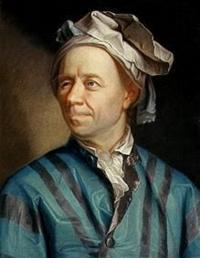Leonhard Euler
Mathematician and physicist, b. 15 April 1707 (Basel, Switzerland), d. 18 September 1783 (St. Petersburg, Russia).
 Leonard Euler's father Paul Euler was a Protestant minister. As a student of theology he had lived in the house of the Bernoullis, and the young Leonard had picked up his first knowledge of the world of mathematics from his father's friendship with this famous family of mathematicians.
Leonard Euler's father Paul Euler was a Protestant minister. As a student of theology he had lived in the house of the Bernoullis, and the young Leonard had picked up his first knowledge of the world of mathematics from his father's friendship with this famous family of mathematicians.
At the age of 14 the young Euler entered university, where according to his father's wish he was to be educated for the service of the church. But his interest was in mathematics, which Johann Bernoulli, professor at the university, soon discovered. In his autobiography Euler wrote
- "I soon found an opportunity to be introduced to a famous professor Johann Bernoulli. ... True, he was very busy and so refused flatly to give me private lessons; but he gave me much more valuable advice to start reading more difficult mathematical books on my own and to study them as diligently as I could; if I came across some obstacle or difficulty, I was given permission to visit him freely every Sunday afternoon and he kindly explained to me everything I could not understand."
Euler was awarded his Master's degree in philosophy in 1723 with a thesis on the ideas of Descartes and Newton and began his study of theology. Eventually Johann Bernoulli managed to change Paul Euler's mind, and Leonard was allowed to transfer to mathematics. He obtained his degree in 1726.
In the following year the 19 year old Euler submitted an entry to the competition of French Academy of Sciences on the best arrangement of mast on a ship and won the second prize. Looking for employment, he was offered a position at the recently established Russian Academy of Sciences in St. Petersburg and applied for the chair of physics at the University of Basel. When the Basel appointment did not materialize he accepted the position of professor of physics in St. Petersburg and moved in with Daniel Bernoulli, who held the senior chair of mathematics.
In 1733 Bernoulli returned to Basel, and Euler was appointed as his successor. He began what developed into a prolific publishing career, and indications are that he damaged his health through excessive work. One of his responsibilities was cartography, which strained his eyes to such an extent that by about 1738 he had lost the use of one eye.
Euler shared the Grand Prize of the French Academy of Sciences in 1738 and 1740. His high reputation brought him an invitation from Frederick the Great to Berlin, where the Society of Sciences was to be replaced by a new Academy of Sciences. Euler went to Berlin in 1741 but continued to receive part of his salary from Russia. He used his stay to purchase books and instruments for the Academy in St. Petersburg and taught Russian students.
His service for the Prussian Academy included supervision of the botanical gardens and the observatory and the organization of the library and the Academy's publications. He continued to publish; some 380 articles appeared under his name during the 25 years of his stay in Berlin.
The king, who called Euler "my professor," did not allow the Academy to be run without his direct supervision, which was not to Euler's liking. In 1766 he decided to return to St. Petersburg, much to the king's anger. Soon after his return he lost the use of his remaining eye and did all his remaining work as a blind man. As an esteemed and venerated mathematician he had of course the assistance of students and colleagues, but during the 17 years until his death he did much of his research including complicated calculations entirely in his head.
Euler left 856 books and articles, most of them in Latin, on subjects
from general calculus to problems of mechanics, optics, acoustics and astronomy. He was always prepared to take on new work, often to the detriment of his health, and at the same time generous to colleagues who worked on similar themes. When he was told that the mathematician McLaurin had found a theorem that proved the same result Euler had also found he wrote:
- "I have very little desire for anything to be detracted from the fame of the celebrated Mr Maclaurin since he probably came upon the same theorem for summing series before me, and consequently deserves to be named as its first discoverer. For I found that theorem about four years ago, at which time I also described its proof and application in greater detail to our Academy."
Russia's strong mathematical tradition has its origins in Euler's work during his residence in St. Petersburg.
Reference
O'Connor, J. J. and E. F. Robertson: Leonard Euler. http://www-groups.cs.st-and.ac.uk/~history/Mathematicians/Euler.html (accessed 29 February 2004.
Portrait: oil painting by Emanuel Handmann, Basel; public domain (Wikipedia)
home
 Leonard Euler's father Paul Euler was a Protestant minister. As a student of theology he had lived in the house of the Bernoullis, and the young Leonard had picked up his first knowledge of the world of mathematics from his father's friendship with this famous family of mathematicians.
Leonard Euler's father Paul Euler was a Protestant minister. As a student of theology he had lived in the house of the Bernoullis, and the young Leonard had picked up his first knowledge of the world of mathematics from his father's friendship with this famous family of mathematicians.